“Never work before breakfast; if you have to work before breakfast, eat your breakfast first.”
~Josh Billings
Many of us know we should never skip breakfast. Besides that – and it is not less important – we should eat our breakfast within one hour after waking up. This will help boost our metabolism.
If you skip breakfast your body adjusts metabolism by slowing it down to conserve calories and store fat reserves. Also, skipping breakfast leads to a higher caloric intake at night that promotes fat storage and weight gain.
If you find it hard to eat in the morning, it may be because your last meal of the day is the largest what makes you feel less hungry for breakfast. In order to increase your appetite for the morning meal, you need to start eating less at the evening meal.
Breakfast provides you with the energy and nutrients that not only lead to increased concentration, but help feel full during the morning and help resist snacking on foods that are high in fat and sugar as well. That way eating breakfast can help you lose weight or maintain it at a healthy level.
If you are one of those people who skip breakfast because you think you are too busy getting ready, or you don’t eat in the morning because you are trying to lose weight, read the 10 tips below. Using these tips may help you start eating a healthy breakfast which will provide you with many health benefits and help lose or control your weight:
1. Plan Your Breakfast
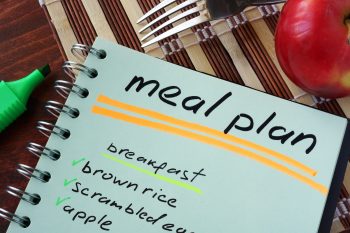
Plan your morning meals in advance. Decide what you are going to eat for breakfast the night before and, if you need, prepare some food to have it ready-to-eat in the morning.
When you plan it ahead, having breakfast will not take too much time in the morning. Besides, this can help you lose weight as you can plan ahead healthier choices instead of grabbing something on the go.
Think of breakfast foods before you go grocery shopping to make sure you stock up on healthy foods and have enough for each morning.
2. Aim for a Big Meal
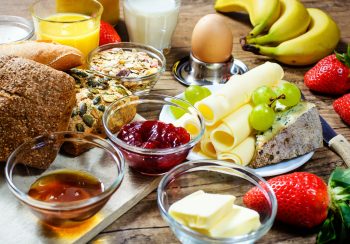
Breakfast should be one of your big meals of the day. Aim for a 350-to-500-calorie healthy meal. This will help reduce cravings, feel full until your next meal, and eat fewer calories later in the day.
In order to determine the more accurate number of calories you should consume, you can calculate it by devoting three-fourths of total daily calories to three meals (about the same number of calories to each meal) and the remainder to two or three snacks. As a result, breakfast should contain about 25 percent of your total daily calorie intake.
You do not need to count calories very accurately, instead, make sure you consume the right foods. If you go for whole foods and single ingredient foods, you will naturally consume less calories as these foods are naturally filling. Also, it will be easier to count calories of such foods if you decide to go for that.
3. Have Your Carbs
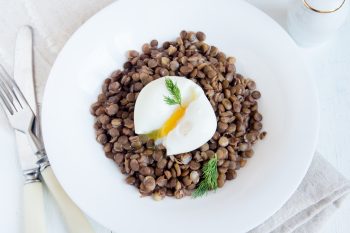
Start your day with a higher intake of carbohydrates. They are the most important source of energy for your body and you need them for the start of your day to have it more productive.
The type of carbohydrates you choose makes a difference in your energy level, your weight and your risk of chronic disease. For a healthy diet, choose whole grains (for example, oatmeal, buckwheat) over refined grains (like breads, cereals) and limit the amount of added sugar.
Whole grains (as they contain fiber and are very nutritious) will help you feel full longer and will provide you with a long-lasting energy throughout the day (as they are absorbed by your body more gradually and within a longer period). Refined carbs can lead to rapid spikes in blood sugar, cravings, and increased food intake a few hours later.
To make your breakfast faster you can buy instant grain porridge or soak your whole grains (like rice, lentil, millet, quinoa) 12 to 24 hours at room temperature in some water and heat it up in the morning. Also, soaked grains are easier to digest and make vitamins and minerals easier to absorb.
4. Don‘t Forget Protein for Weight Loss

Combine protein foods with carbohydrates as this will provide you with valuable nutrients and will help lose weight as well. Protein helps control hunger as it helps you feel satiated.
Studies show that including a source of quality protein such as whole eggs at breakfast helps you eat less throughout the day.
Good protein sources include yogurt, cottage cheese, eggs, nuts, lean meat and fish.
5. Choose Nutrient-dense, High-fiber Whole Foods
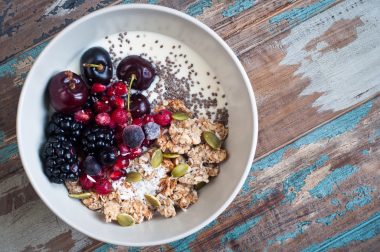
Choose foods that are whole, nutrient-rich, and high-in-fiber and soon you‘ll experience such foods‘ benefits, such as reduced cravings, weight loss, and increased energy.
For example, instead of ready-to-eat high-calorie sweetened breakfast cereals choose quick oatmeal porridge with cut-up fruits and/or berries, seeds and nuts. Replace empty-calorie bars and sweets with nutrient-dense foods, like fruits, berries, nuts, etc.
A breakfast with insufficient fiber releases sugars into the blood too quickly resulting in a spike in blood-sugar levels (which might in turn increase the risk of diabetes). This leads to cravings and eating too much later in the day.
Among high-fiber foods are oats, buckwheat, barley, avocados, apples, pears, raspberries, blackberries, dried figs, almonds, flax seeds, sunflower seeds, chia seeds, peas, beans, lentils, carrots, artichoke.
6. Add Taste to Your Food Naturally
By eating more real food you don‘t have to sacrifice taste. To make your food taste better, add natural ingredients to it. For exapmle, if you want to have your yougurt or oatmeal porridge sweet, add fruits, berries, or a small amount of honey to it.
If you don‘t want it sweet, you can try adding a little salt, fresh chilli or spice, and a little amount of olive oil. Such additives will provide you with additional nutrients that will be useful throughout the day. Besides that, avoiding presweetened foods (like breakfast cereals) will help reduce cravings and lose weight or maintain it at a healthy level.
7. Go for a Variety
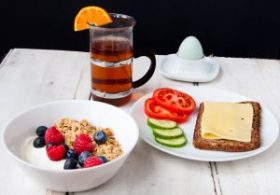
Pick 2-3 foods, at least one from each food group: (1) bread and grain group (i.e. whole-grain bread, whole-grain cereals, oatmeal porridge), (2) milk product group (i.e. low-fat yogurt, kefir, cottage cheese) and (3) fruit and vegetable group (i.e. apples, bananas, tomatoes, avocados).
The variety will help you get more nutrients and feel full longer. This will contribute not only to your health and weight loss, but to the productive start of your day as well.
8. Be Ready For Eating On the Go
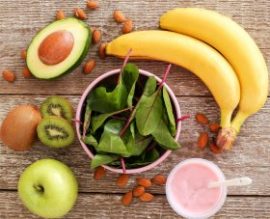
When at grocery store make sure to buy enough foods like fruit, nuts, plain yogurt, whole-grain breakfast bars for those mornings when you have to eat breakfast on the go.
Make sure the foods you buy are not loaded with added sugar and do not have long ingredient list.
Choosing plain whole foods instead of unhealthy bars loaded with sugars will help keep a good start of your day with eating-on-the-go-breakfast. And you will feel full longer and avoid cravings later in the day.
9. Choose the Lesser of Two Evils
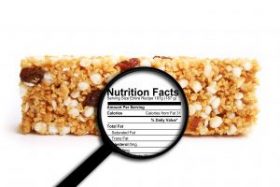
When you decide to go for breakfast cereals and snack bars, in order to benefit from such foods without gaining excessive weight and putting your health at risk, read labels as you make your choice.
Choose bars that have lower sugar content. Focus on finding low-sugar cereals. Look for those that contain more fiber. And make sure these foods are rarely on your breakfast list.
10. Choose Fruits instead of Fruit Juice
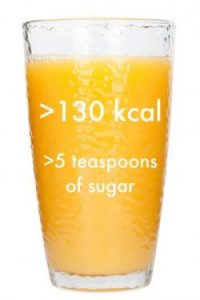
Fruit juice is concentrated in terms of sugar so as calories. Furthermore, packaged, canned or bottled fruit juice is only the illussion of a healthy food – it contains added sugar and, unlike fresh juice, is usually treated to extend the shelf life of the product, and preservative is inevitable.
It‘s better to eat fruits instead of drinking juice. That way you will get fiber and more nutrients. The fiber will help you feel full longer, and this will help you in controlling your weight.
However, your body needs fluids in the morning, so having a glass of water with lemon in the morning before breakfast would benefit you in many ways. Lemon water doesn’t just quench thirst better than any other drink – it also provides your body with plenty of vitamins and minerals. Besides that, it helps clean out toxins and lose weight.
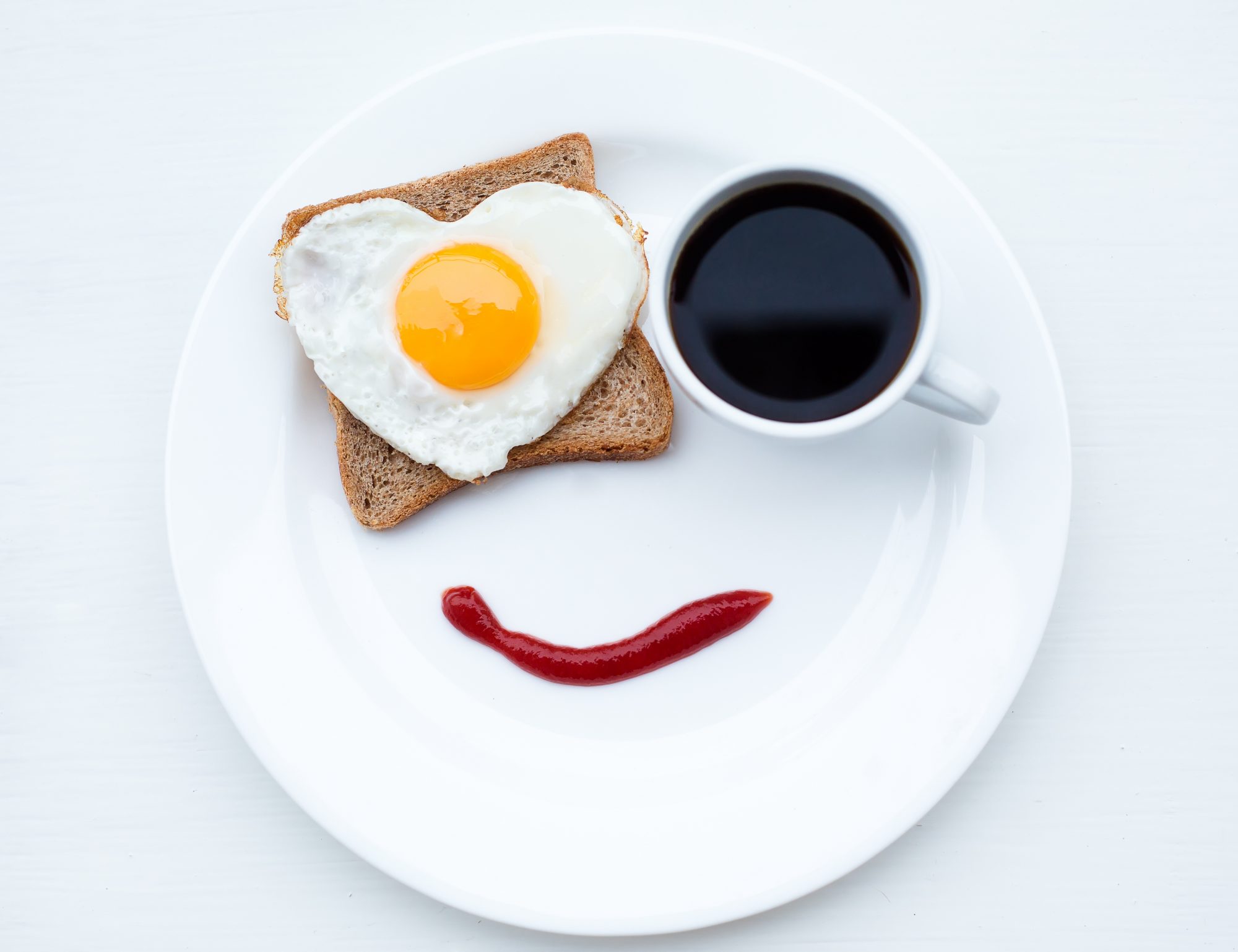










Great article.
You shouldn’t skip breakfast ever!
Breakfast is the most important meal.
beautyandhealthlife.com/breakfast-for-weight-loss/
I loved when you mentioned how you should eat protein if you want to lose weight. It is important to remember that doing this can help your body metabolize energy better. My wife and I are trying to lose weight, so I’ll share your tips with her.